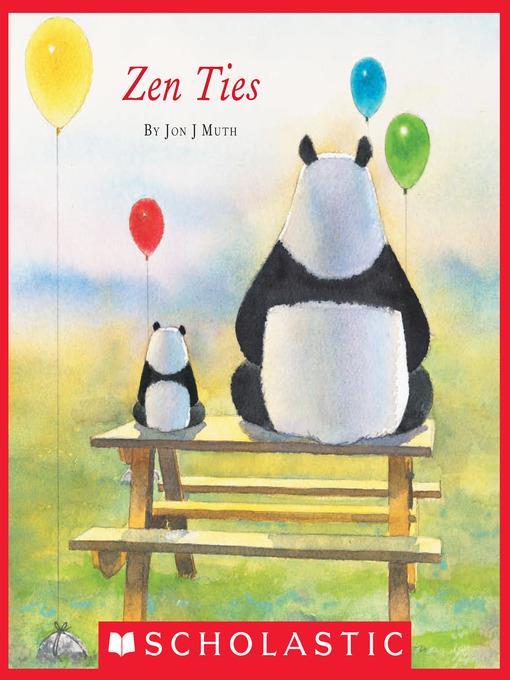
Zen Ties
Stillwater the Panda
فرمت کتاب
ebook
تاریخ انتشار
2015
Lexile Score
460
Reading Level
0-2
ATOS
2.7
Interest Level
K-3(LG)
نویسنده
Jon J. Muthناشر
Scholastic Inc.شابک
9780545825764
کتاب های مرتبط
- اطلاعات
- نقد و بررسی
- دیدگاه کاربران
نقد و بررسی

Starred review from November 19, 2007
Stillwater, the giant panda who taught Zen parables to siblings Karl, Addy and Michael in Zen Shorts,
continues to combine his slow-moving grace with genuine spiritual tranquility. This time, Michael faces a daunting spelling bee, and Stillwater, first seen wearing a necktie, introduces the three to Miss Whitaker, an elderly neighbor whose crabby outbursts have frightened them. Stillwater’s inward eye sees through her anger to her fear and loneliness. She turns out to be a marvelous spelling coach (“Just like plants, words have roots,” she tells Michael. “Roots of words can teach you to spell”), and when Michael wins a red ribbon, the pictures show the whole group sharing his victory with their own red ribbons—the “Zen ties” of the title. (Zentai
is Japanese for “the whole” or “the entire,” as in “all of us together.”) A subplot featuring Koo, Stillwater’s nephew, drifts a bit; he’s a cute little panda who punctuates the action with Zen-influenced haiku (and allows Muth another pun: “Hi, Koo!”). Muth’s brush is as sure as ever; Stillwater’s big, blunt paws and hunched-over listening posture are irresistible, and Miss Whitaker’s delicate face and snow-white hair beautifully counterpoint the vignettes of youthful play. From a religious tradition that makes no theological demands and that will be unfamiliar to most readers, Stillwater offers a model of pure saintliness, and children will instantly respond to him. All ages.

April 1, 2008
Gr 1-5-Giant panda Stillwater introduces Addy, Michael, and Karl, first encountered in "Zen Shorts" (Scholastic, 2005), to his young nephew, Koo. After playing together, he suggests that they make soup for ailing Miss Whitaker. The children initially protest because she shouts at them whenever they pass her house, but they comply. Even when they deliver the soup, tidy her house, and draw her pictures, the old woman doesn't soften substantially. Stillwater, who is insightful enough to recognize harshness as a sign of Miss Whitaker's loneliness and fear, encourages Michael to approach her for help preparing for a spelling bee. It turns out she was a talented English teacher and when he follows her advice, he wins a ribbon. Much more is going on here than Stillwater's quiet message that there is more to people than outward appearances. Koo speaks in loosely structured haiku, and as explained in his author's note, this affords Muth an opportunity to engage in wordplay. Miss Whitaker's change of heart is foreshadowed in a close-up of her examining Karl's painting after she had previously dismissed the children's efforts. All of the characters are "tied" together in the Zen wisdom they have attained and symbolically in the red ties they wear to celebrate Michael's spelling success. From the lovely large watercolor illustrations that include Stillwater and Koo doing Tai Chi on the endpapers, to the lesson presented without sentimentality, this is a rich and wonderful offering."Marianne Saccardi, formerly at Norwalk Community College, CT"
Copyright 2008 School Library Journal, LLC Used with permission.

February 15, 2008
Muth follows his Caldecott Honor Book Zen Shorts (2005) with another quiet, contemplative story about Stillwater the giant panda and his three young friends, siblings Michael, Karl, and Addie. This title introduces Stillwaters young nephew, Koo, who arrives for a visit and quickly befriends the neighborhood kids. Together, the group accompanies Stillwater to the home of an elderly neighbor, Miss Whitaker, who has always terrified the children: She hates us! . . . Every time we walk past her house, she shouts! says Michael. Gradually, with Stillwaters kindhearted example, the kids come to enjoy spending time with Miss Whitaker, who, in turn, helps Michael prepare for aspelling bee that he has been dreading. Unlike Zen Shorts, this meandering story doesnt include Zen koans, but the overt messages about compassionate action knit smoothly into Buddhist teachings. Koo, whose name makes a pun (Hi, Koo!), speaks in poetry that sometimes feels distracting and forced, but the gorgeous watercolors, full of depth and expression, will draw children back into the gentle tale of intergenerational (and interspecies) friendship.(Reprinted with permission of Booklist, copyright 2008, American Library Association.)

























دیدگاه کاربران